 |
SINGLES COUPLES Billionaires For Unlimited Inheritance
Estate Tax Backgrounder
[OUT OF CHARACTER]:
The federal estate tax is a tax on the transfer of assets at death. When someone dies, his or her assets (the person's estate) are distributed to heirs. If the total value of the estate is large enough, an estate tax is imposed before the remaining assets are distributed.
Q: How large must an estate be to be taxed?
In 2006, the net value of an individual's estate must exceed the basic exemption of $2 million. Couples can exempt $4 million. This exemption level will gradually rise to $3.5 million for an individual ($7 million for a couple) by 2009. Small businesses and farms have long enjoyed additional protections.
Q: What is the effective estate tax rate?
For the 2006 tax year, the top estate tax rate is 46%. However, after the $2 million basic exemption and other deductions are applied, the average effective estate tax rate -- the percentage of the total estate actually paid in taxes -- works out to be much lower. In 2001, when the top rate was 55%, the average effective estate tax rate was only 19%. Today, with a lower top rate and a higher exemption, the average effective tax rate would be even lower.
Q: What are the actual estate tax rates?
Here are the rates for the 2006 tax year. Remember that the "taxable estate" is the estate left after all bequests to a spouse or to charity are deducted. An estate passes completely tax-free to a spouse, along with the decedent's exemption.
Taxable Estate SizeEstate
Tax
$0 to $2 million
Zero
$2.0 million and up
46% of the amount over $2,000,000
Taxable Estate SizeEstate
Tax
$0 to $4.0 million
Zero
$4.0 million and up
46% of the amount over $4,000,000
Q: Who pays the estate tax?
In 2006, the wealthiest 0.27% of Americans are the only ones who pay estate taxes. In 2001, over half of all estate taxes were paid by 3,502 people with estates larger than $5 million -- representing the top 0.14% of all Americans.
Q: How much does the 2001 Estate Tax cuts cost the American Treasury?
Between 2001 and 2010, lost revenue will equal approximately $442 billion.
If the Estate Tax is repealed as proposed, lost revenue between 2011 and 2021 will be as much as $1 trillion.
Q: If no changes are made, what will happen to the estate tax?
Under current law, the estate tax will be gradually phased out until the year 2010, when it will disappear entirely. Then, in 2011, the estate tax repeal "sunsets," which means that the estate tax comes back into force, with the same $1 million exemption and 55% top rate it had in 2001. This convoluted "sunset" process was set up to artificially limit the total cost of the estate tax repeal. Pro-repeal forces assumed they could come back and permanently repeal the estate tax later, which is exactly what they tried to do each year since then. Fortunately, supporters of estate tax reform rallied to defeat repeal. We expect to fight another attempt to repeal the tax this year.
Q: What do Americans think about repealing the estate tax?
They're against it. A Jan. 2006 poll of 1,026 adults 18 and over found that 71 percent of respondents were "concerned" or "very concerned" about the current federal deficit. 69% viewed keeping the estate tax on estates over $2 million as the best of eight possible ways to reduce the deficit.
A 2005 poll found that when voters hear all the facts about the estate tax, 69% favor reform and only 22% favor repeal. This includes 64% of Republicans, 72% of Independents, and 66% who own a farm or business. Americans would prefer to spend the revenue on other priorities rather than repealing the estate tax. 73% prefer to spend the money on Social Security solvency; 67% prefer spending the money on K-12 education; and 56% prefer spending the money on homeland security.
A survey conducted in May 2002 found that when voters hear all the facts about the estate tax, 67% support reforming the tax, while only 27% support repealing it.
Why is it important to reform, rather than repeal, the estate tax?
If we repeal the estate tax, the burden of paying for public services will shift to low- and middle-income taxpayers. States will lose billions of dollars in revenue, since many states get a credit from the estate tax. Giant new tax loopholes will appear, permitting the very wealthy to avoid capital gains taxes and other taxes they now pay. Overall, repealing rather than reforming the estate tax will further concentrate economic and political power in the hands of the richest 0.1% of American families.
The Case for Reform: How it should be done:
We could set the basic exemption at $2 million ($4 million for couples). This reform would exempt about 99.7% of the households in the US. Proposals like this have been offered in Congress since 2000. But the all-or-nothing repeal lobby has voted to completely oppose them. They want to hold smaller millionaires, family farmers, and small business people hostage in order to win complete repeal for their ultra-wealthy patrons.
More information can be found at:
FairEconomy.org
Coalition4americaspriorities.com
Billionaire CD!
Stay the Course!

what you pay
per song!
Give 'em a listen!
Click here.
2008 Billionaire
Wall Calendar
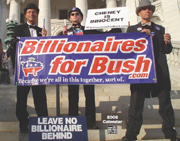
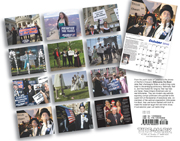 Click here.
Click here. on DVD!
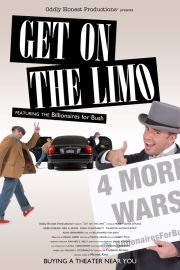 Catch the trailer at GetontheLimo.com
Catch the trailer at GetontheLimo.com(Website requires Flash Player 8)
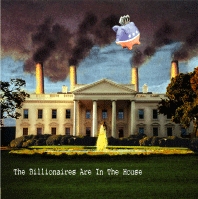
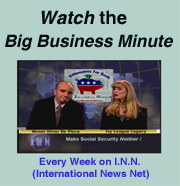
Watch the archives on the I.N.N. website, including a clip show of the first season,

Social Insecurity Calculator
See how much privatization will cost
taxpayers while we
reap billions!

Discover your
Billionaire name!

